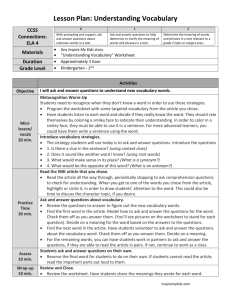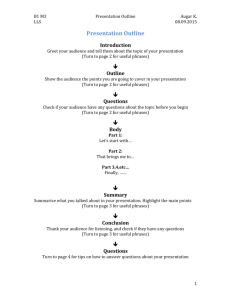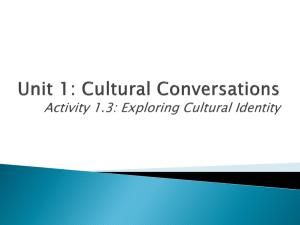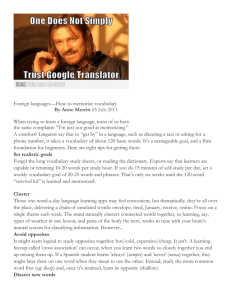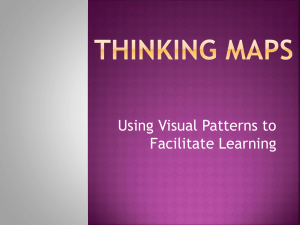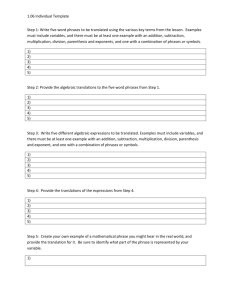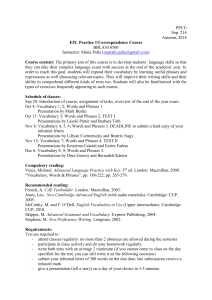Language Detectives Project Plan
advertisement
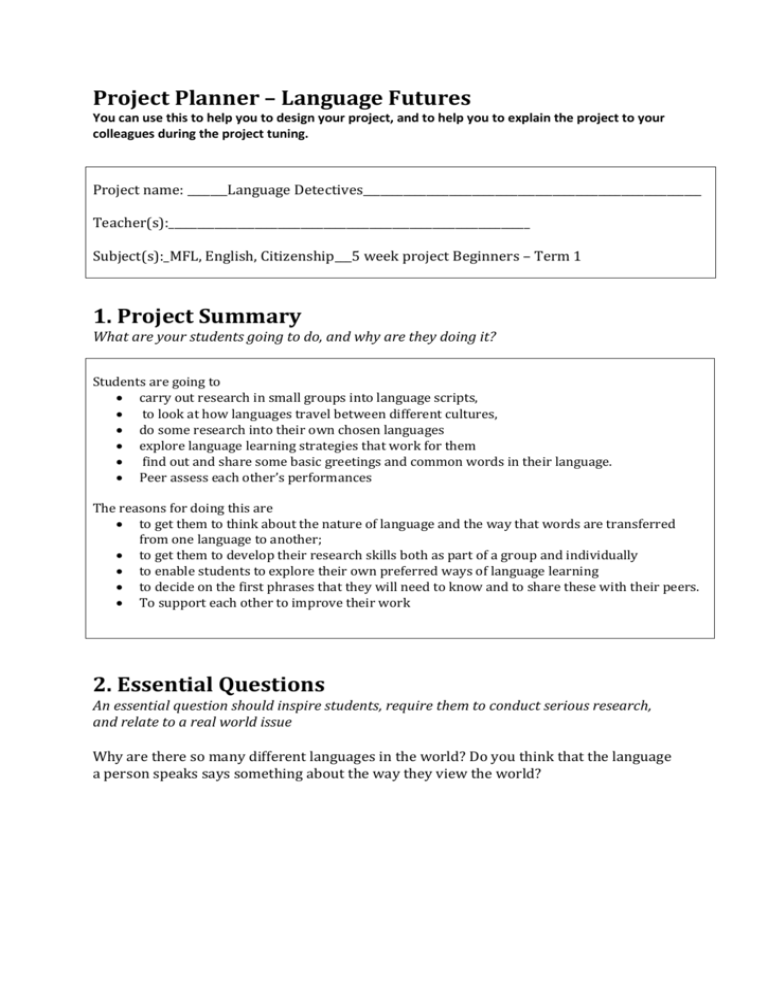
Project Planner – Language Futures You can use this to help you to design your project, and to help you to explain the project to your colleagues during the project tuning. Project name: _______Language Detectives___________________________________________________________ Teacher(s):_______________________________________________________________ Subject(s):_MFL, English, Citizenship___5 week project Beginners – Term 1 1. Project Summary What are your students going to do, and why are they doing it? Students are going to carry out research in small groups into language scripts, to look at how languages travel between different cultures, do some research into their own chosen languages explore language learning strategies that work for them find out and share some basic greetings and common words in their language. Peer assess each other’s performances The reasons for doing this are to get them to think about the nature of language and the way that words are transferred from one language to another; to get them to develop their research skills both as part of a group and individually to enable students to explore their own preferred ways of language learning to decide on the first phrases that they will need to know and to share these with their peers. To support each other to improve their work 2. Essential Questions An essential question should inspire students, require them to conduct serious research, and relate to a real world issue Why are there so many different languages in the world? Do you think that the language a person speaks says something about the way they view the world? 3. Products What do you want students to do/write/create/build? A group presentation about the processes they used to discover the origins of texts A sharing of language learning strategies with the others in their group Conversations around the class greeting each other and saying key words A reflective journal where they comment on the language learning strategies (LLS) that they are beginning to use plus the beginnings of a way of recording good LLS and vocabulary Posters to display to explain what has been involved in this project 4. Learning Goals What do you want students to learn? Identify the curriculum content that students will learn in this project. To understand that languages are fluid and changing and borrow words from each other To find out, learn and say basic greetings and phrases to start off their language learning Identify key skills students will learn in this project. List only those skills you plan to assess. Develop research skills – to be able to use the internet including google translate and the Newbury Park website To be able to work in a group To be able to summarise in a poster the content and processes used in their research To develop Language learning strategies To be able to write a reflective journal To be able to design ways of recording good LLS and basic phrases 5. Timeline/Milestones List the key dates and important milestones for this project. (eg check-ins, critique sessions, deadlines for drafts and specific product components) Timeline Content/deliverables Week 1 Introduce a real life situation – e.g. a Production Company has asked you to solve the mystery of an artefact discovered with an unknown script. Students in groups have to use the internet to try to discover what the script is and what is the mystery of the artefact. Students share knowledge of own languages with each other. Students then look at the English language and identify where words in English are borrowed from. Out of school challenge is to watch an episode of “Who do you think you are?” Maps and a globe are used to plot migration routes across the world. Week 2 Students share the script of languages that they speak or ones that they plan to learn. Whole class discussion on comparisons and contrasts, sounds and scripts. In language groups, using maps, identify the geographical areas where your home and chosen languages are spoken. Language mentors present to their language groups aspects of culture, food and traditions associated with their language. Week 3 Students use the section on the website on Language Learning and Skills to explore ways that they want to learn. Each student to identify 5 strategies that they feel they will use. They record these in their reflective journal and prepare a presentation to their language group as to the reasons why they have chosen these. Peer assessment Week 4 Students work in their language groups to identify key features of their chosen language. Groups agree a list of key features and do a presentation to the other language groups. Record these in the reflective journal. Week 5 Students use the Worksheet on Basic language in the Classroom Resources section of the website and record basic greetings and words needed to start communicating in a new language. Learn these greetings, words and phrases and circulate around the room talking to different members of the class. Teacher to assess speaking. Produce a poster to summarise the work that has been done and use this to advertise a presentation to teachers, other students, possibly parents. 6. Personalisation Say how you will personalise the project, especially for individual students who will need specialized support Since differentiation will be by outcome, each student will have the opportunity to show what she/he can do at their own level Students will receive support from their mentor Students will work in groups for much of the project and will support each other. All students will have the chance to reflect on their own favourite language learning styles and to work in ways that suit them best 7. Exhibition venue and plan Where will the exhibition take place? The “exhibition” will be in the form of group presentations of processes used to uncover the language; individual presentations on own preferred language learning strategies; and greeting audience and saying other key phrases. Posters will be produced to explain the essence of what has been done; parents, teachers, mentors and other interested adults and students will be invited. Each group will display their posters – other ways of presenting will be decided by the students. 8. Resources The following websites and other sources are suggested for aspects of the project work: www.newburypark.redbridge.sch.uk - A wealth of ideas for promoting language learning. Of particular interest is the Language of the Month section. Enter site, select language of the month, resources for schools and teachers - select language - basics (first words) Hawkins E (1987) Language Awareness: an Introduction, CUP http://www.alistairsmithlearning/tag/independent-learning-and-thinking - Alistair Smith is one of the foremost thinkers and trainers on ways of becoming independent learners Worksheet in Classroom Resources on Language Basics Worksheet in Classroom Resources on the origin of words Power point slides on Spanish animals in Language Learning and Skills section Article on being a polyglot in Language Learning and Skills section www.mylanguages.org 9. Assessment Criteria How will you be assessing each of your learning goals you identified? Curriculum content: Assessment methods To understand that languages are fluid Through discussion and changing and borrow words from By use of a quiz on where words were each other borrowed from By showing that they can identify the movement of languages on a globe By completing the worksheet in Classroom Resources on the origin of words To find out and learn basic greetings and Through the round robin greetings with phrases to start off their language peers learning By completing the worksheet on Language Basics in Classroom Resources Recording of basic phrases in journal Assess speaking either on the CEFR A1 level “I can use simple phrases and sentences ….” Or the Language Ladder Grade 1 “I can say and repeat single words and short simple phrases”. Skills: Develop research skills Be able to work as a member of a group Be able to summarise in a poster the key content and processes carried out Develop Language Learning Strategies Be able to write a reflective journal Be able to design ways of recording good LLS and basic phrases Assessment methods Observations and outcomes Observations and discussions The design and production of a poster Peer assessment when explaining chosen strategies Notes in reflective journal Scrutiny of reflective journal Scrutiny of reflective journal plus other recording formats (Note: Once you’ve completed this section, make sure you add all the assessment points to the project timeline) Suggested assessment format to be used by peers as each student explains their own preferred Language Learning Strategies Please tick the most appropriate category and give your reasons Excellent Very good What do you think of the student’s presentation? Which strategy do you think you will try out? Why? Suggest a new strategy that the student could try out. Good Notes, feedback, comments

